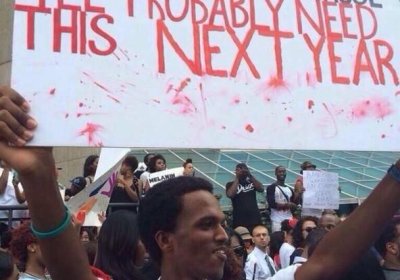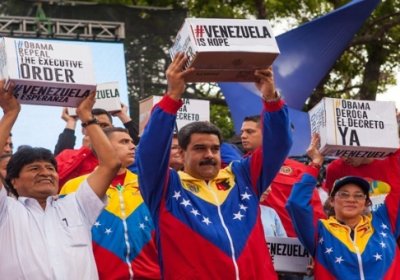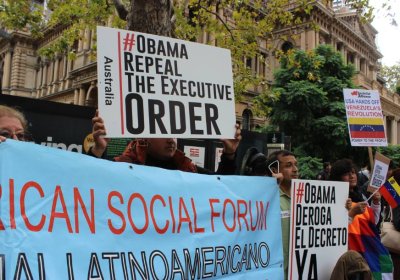There is a tense stand-off right now between Greece's government and the so-called troika — the European Commission, the European Central Bank (ECB), and the International Monetary Fund (IMF). ECB President Mario Draghi recently went so far as to deny that his institution was trying to blackmail Greece's left-wing anti-austerity government.
But blackmail is actually an understatement. It has become increasingly clear that the troika is trying to harm the Greek economy in order to raise pressure on the new Greek government to agree to its demands.
World
The United States is providing crucial support to regional ally Saudi Arabia ― a big buyer of US arms ― as it launches a new war in the Middle East by attacking neighbouring Yemen.
A Saudi-led coalition of Western-aligned, mainly Sunni Islamist, Arab government's launched air, naval and ground military offensive against Yemen on March 25.
Saudi Arabian forces are being supported by military planes from the United Arab Emirates, Qatar, Bahrain, Kuwait, Jordan, Morocco, Sudan and Egypt, which is also supplying naval forces.
 A lot is at stake in Turkey’s parliamentary elections to be held on June 7 — for the ruling Justice and Development Party (AKP) as well as the oppressed Kurdish population.
The AKP, led by President Recep Tayyip Erdogan, won 49% of the vote in the 2011 elections and holds 312 of the 550 seats in Turkey’s Grand National Assembly. A Gezici poll taken in January suggests the AKP’s support has slipped 9.7% to just under 40%.
A lot is at stake in Turkey’s parliamentary elections to be held on June 7 — for the ruling Justice and Development Party (AKP) as well as the oppressed Kurdish population.
The AKP, led by President Recep Tayyip Erdogan, won 49% of the vote in the 2011 elections and holds 312 of the 550 seats in Turkey’s Grand National Assembly. A Gezici poll taken in January suggests the AKP’s support has slipped 9.7% to just under 40%.
Jay Famiglietti, a senior water scientist at the NASA Jet Propulsion Laboratory in California, made a dire warning in March: there is only one year's worth of water left in the state's reservoir storage and river basins.
Famiglietti said even nature's oldest water backup supply —groundwater — could be gone soon after the reservoirs dry up.
About 38.8 million people live in California, which produces much of the United States' food. California's drought is throwing the ecology of the region into crisis, and ordinary people are scrambling for ways to help.
Hundreds of protesters took to the streets of Indiana state capital Indianapolis on April 4 to demand legal protection against workplace discrimination based on sexual orientation.
“No hate in our state,” read placards carried by protesters. They marched through the city just days after state legislators revised a controversial religious freedom law that failed to provide protection against discrimination.
Terrorists from Somali Islamist group al-Shabaab massacred 142 students at Garissa University in northern Kenya on April 2. In response, the Kenyan airforce bombed what they said were al-Shabaab camps in Somalia on April 5 and 6.
Kenyan forces have been occupying Somalia since October 2011, under African Union (AU) auspices, along with troops from Uganda and Burundi.
On April 7, students protested in Garissa and the Kenyan capital, Nairobi, against the seven-hour delay in security forces reaching the university during the attack.
Fears over the safety of the 18,000 civilians trapped in Yarmouk, south of the Syrian capital of Damascus, have grown following reports that the Islamic State (IS) terrorist group has taken control of large areas of the Palestinian refugee camp.
The IS, notorious for its brutal execution of hostages in the areas it occupies in Iraq and Syria, infiltrated Yarmouk camp on April 1.
A new police murder of an unarmed Black man in the United States has received global attention. It comes as the #BlackLivesMatter movement has swept the country since the police murder of an unarmed Black teenager in Ferguson, Missouri last August.
On April 4, officer Michael Slager in North Charleston, South Carolina, shot 50-year-old Walter Scott in the back as he was fleeing.
The police initially tried to whitewash the incident, with the all-too-familiar assertion that Slager was assaulted by Scott and feared for his life. So the killing was justified. Q.E.D.
Venezuelan President Nicolas Maduro, along with his Bolivian counterpart Evo Morales, received a petition with 10 million signatures against U.S. President Barack Obama's executive order labelling the country as a “security treat” on April 9.
After the decree was issued, Maduro launched a campaign seeking 10 million signatures from Venezuelans demanding the decree be repealed, saying he would present them to the U.S. President Barack Obama at the April 10-11 Summit of the Americas in Panama.
US President Barack Obama admitted on April 9 that Venezuela “does not pose a threat” to the United States.
“We do not believe that Venezuela poses a threat to the United States, nor does the United States threaten the Venezuelan government,” Obama said during an interview with EFE.
Last month, Obama signed an executive order declaring Venezuela an “unusual and extraordinary threat to the national security and foreign policy of the United States.”
In the early hours of the morning on April 7, the Malaysian parliament reintroduced powers of indefinite detention without trial in the form of a new Prevention of Terrorism Act (POTA). Such powers, previously under the Internal Security Act and Emergency Ordinance — which were repealed in 2012 under popular pressure — have a notorious history of being used by British colonial and, after independence, Malaysian authorities to detain political dissidents.
The Venezuelan government-initiated campaign calling for US President Barack Obama to repeal his executive order that arbitrarily declares Venezuela an "extraordinary threat" to US "national security" had more than 6 million signatures as March 31.
Venezuelan President Nicolas Maduro announced on his weekly television program that the campaign has collected 6.2 million signatures so far. “I believe that Obama's threat has awoken a great amount of love for what we are going for in our country,” said Maduro.
- Previous page
- Page 380
- Next page










